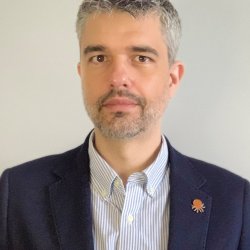
Dr Iñaki Deza-Cruz
Academic and research departments
School of Veterinary Medicine, Faculty of Health and Medical Sciences.About
Biography
Iñaki Deza-Cruz is a public health veterinarian with an interest in disease modelling. He graduated from the University of Zaragoza, Spain, in 2001 and obtained his doctorate degree in epidemiology of arboviral diseases at Newcastle University, UK, and Ross University School of Veterinary Medicine in St. Kitts and Nevis in 2018. In 2021, he became a Diplomate of the American College of Veterinary Preventive Medicine (DipACVPM).
Iñaki is an enthusiastic teacher and has taught Veterinary Public Health at the University of Surrey and at the University of Edinburgh. Prior to his academic path, he developed an extensive career as a government veterinarian. He has worked at the Animal and Plant Health Agency (APHA) and the Food Standards Agency (FSA) where he was actively involved in the assessment of food safety and animal welfare official requirements and the implementation of regulatory controls in food establishments.
Areas of specialism
My qualifications
ResearchResearch interests
My research focuses in the interface of human and animal health. I am interested in investigating current threats and untangling hazards within a One Health framework. I have developed complex models of arboviral transmission and mosquito population models using Generalized Estimating Equations, Cox PH models and Bayesian techniques.
My current interests involve studying the burden of microplastics in farm animals and the risk of exposure and bioaccumulation in humans and animals. The attention to microplastics has increased recently with most studies investigating microplastics in marine environments and seafood. However, there is little known about the extent of pollution in farm animals and the pathways of contamination into the food chain.
Further pursuits comprise the investigation of novel teaching tools based on Augmented Reality simulations to enhance learning outcomes and mitigate anxiety in veterinary students.
Research projects
Quantifying the risk of exposure to microplastics in meat and farm animals in the UKThe focus of this PhD is to progress our understanding of the different pathways by which microplastics reach farm animals and meats, and to quantify and model the risk of exposure to the consumer. To achieve this, the successful candidate will be involved in a multidisciplinary supervisory team that combines a broad range of expertise, including veterinarians, modellers, experts in radiolabelling, analytical and synthesis chemistry and will provide mentoring in research and technology transfer, as well as impact generation.
The study will be ecological in nature, but will provide you with an extensive training in spectroscopy techniques making use of extensive facilities at the University of Surrey, including Fourier-transform infrared spectroscopy (FTIR) spectroscopy, plus relevant field visits.
Systematic review of AMR in the environmentHuman, animal, and environmental health are increasingly threatened by the emergence and spread of antibiotic resistance. Inappropriate use of antimicrobial treatments commonly contributes to this threat, but it is also becoming apparent that environmental conditions can play a significant role. This study seeks to identify the environmental factors which may be associated with the abundance or detection of antibiotic resistance determinants in the outdoor environment, \ie antibiotic resistant bacteria and mobile genetic elements carrying antibiotic resistance genes, and their exposure to local environmental conditions of either natural or anthropogenic origin. The broad and multidisciplinary nature of the problem poses a number of open questions drawing upon a wide heterogeneous range of studies, and thus requires a One Health view.
Research interests
My research focuses in the interface of human and animal health. I am interested in investigating current threats and untangling hazards within a One Health framework. I have developed complex models of arboviral transmission and mosquito population models using Generalized Estimating Equations, Cox PH models and Bayesian techniques.
My current interests involve studying the burden of microplastics in farm animals and the risk of exposure and bioaccumulation in humans and animals. The attention to microplastics has increased recently with most studies investigating microplastics in marine environments and seafood. However, there is little known about the extent of pollution in farm animals and the pathways of contamination into the food chain.
Further pursuits comprise the investigation of novel teaching tools based on Augmented Reality simulations to enhance learning outcomes and mitigate anxiety in veterinary students.
Research projects
The focus of this PhD is to progress our understanding of the different pathways by which microplastics reach farm animals and meats, and to quantify and model the risk of exposure to the consumer. To achieve this, the successful candidate will be involved in a multidisciplinary supervisory team that combines a broad range of expertise, including veterinarians, modellers, experts in radiolabelling, analytical and synthesis chemistry and will provide mentoring in research and technology transfer, as well as impact generation.
The study will be ecological in nature, but will provide you with an extensive training in spectroscopy techniques making use of extensive facilities at the University of Surrey, including Fourier-transform infrared spectroscopy (FTIR) spectroscopy, plus relevant field visits.
Human, animal, and environmental health are increasingly threatened by the emergence and spread of antibiotic resistance. Inappropriate use of antimicrobial treatments commonly contributes to this threat, but it is also becoming apparent that environmental conditions can play a significant role. This study seeks to identify the environmental factors which may be associated with the abundance or detection of antibiotic resistance determinants in the outdoor environment, \ie antibiotic resistant bacteria and mobile genetic elements carrying antibiotic resistance genes, and their exposure to local environmental conditions of either natural or anthropogenic origin. The broad and multidisciplinary nature of the problem poses a number of open questions drawing upon a wide heterogeneous range of studies, and thus requires a One Health view.
Supervision
Postgraduate research supervision
Mathematical modelling of the transmission and economic evaluation for PRRSV - Natalia Martinez-Muñoz
Teaching
- VMS5001 - VPH Intramural Rotation
- VMS2008 - Animals in Society II
- VMS3009 - Student research supervisor
Publications
Accurate epidemiological classification guidelines are essential to ensure implementation of adequate public health and social measures. Here, we investigate two frameworks, published in March 2020 and November 2020 by the World Health Organization (WHO) to categorise transmission risks of COVID-19 infection, and assess how well the countries’ self-reported classification tracked their underlying epidemiological situation. We used three modelling approaches: an ordinal longitudinal model, a proportional odds model and a machine learning One-Rule classification algorithm. We applied these models to 202 countries’ daily transmission classification and epidemiological data, and study classification accuracy over time for the period April 2020 to June 2021, when WHO stopped publishing country classifications. Overall, the first published WHO classification, purely qualitative, lacked accuracy. The incidence rate within the previous 14 days was the best predictor with an average accuracy throughout the period of study of 61.5%. However, when each week was assessed independently, the models returned predictive accuracies above 50% only in the first weeks of April 2020. In contrast, the second classification, quantitative in nature, increased significantly the accuracy of transmission labels, with values as high as 94%.
Although sera are most commonly used in serological diagnostic tests for dengue, sometimes only plasma containing ethylenediaminetetraacetic acid (EDTA) may be available. When we studied the performance of a widely used noncommercial dengue ELISA in the detection of reactive IgG in sera and plasma from the same individuals, we found no significant differences in the diagnostic performance of the assay. The inter-specimen coefficient of variation (CV) of the optical density was 0.081 and the concordance correlation coefficient (CCC) was 0.92, showing a very strong agreement between the two matrix specimens. The intra-specimen CV and CCC were higher for plasma than for serum at low dilutions, but similar at high dilutions. Overall, our results show that the performance of a widely used in-house ELISA using plasma containing EDTA is equivalent to serum with the recommendation to assay the plasma specimens in duplicate to reduce variability of results at lower dilutions.
Background
Human, animal, and environmental health are increasingly threatened by the emergence and spread of antibiotic resistance. Inappropriate use of antibiotic treatments commonly contributes to this threat, but it is also becoming apparent that multiple, interconnected environmental factors can play a significant role. Thus, a One Health approach is required for a comprehensive understanding of the environmental dimensions of antibiotic resistance and inform science-based decisions and actions. The broad and multidisciplinary nature of the problem poses several open questions drawing upon a wide heterogeneous range of studies.
Objective
This study seeks to collect and catalogue the evidence of the potential effects of environmental factors on the abundance or detection of antibiotic resistance determinants in the outdoor environment, i.e., antibiotic resistant bacteria and mobile genetic elements carrying antibiotic resistance genes, and the effect on those caused by local environmental conditions of either natural or anthropogenic origin.
Methods
Here, we describe the protocol for a systematic evidence map to address this, which will be performed in adherence to best practice guidelines. We will search the literature from 1990 to present, using the following electronic databases: MEDLINE, Embase, and the Web of Science Core Collection as well as the grey literature. We shall include full-text, scientific articles published in English. Reviewers will work in pairs to screen title, abstract and keywords first and then full-text documents. Data extraction will adhere to a code book purposely designed. Risk of bias assessment will not be conducted as part of this SEM.
We will combine tables, graphs, and other suitable visualisation techniques to compile a database i) of studies investigating the factors associated with the prevalence of antibiotic resistance in the environment and ii) map the distribution, network, cross-disciplinarity, impact and trends in the literature
